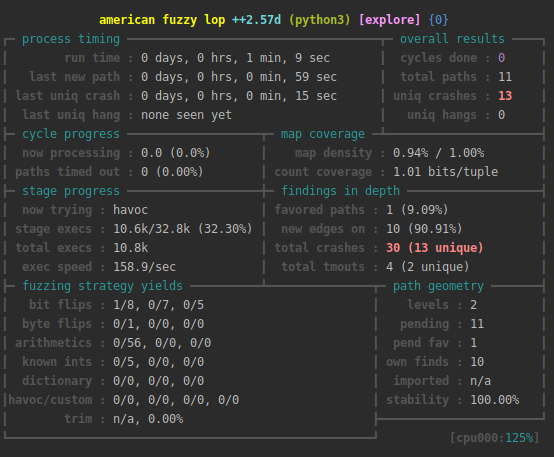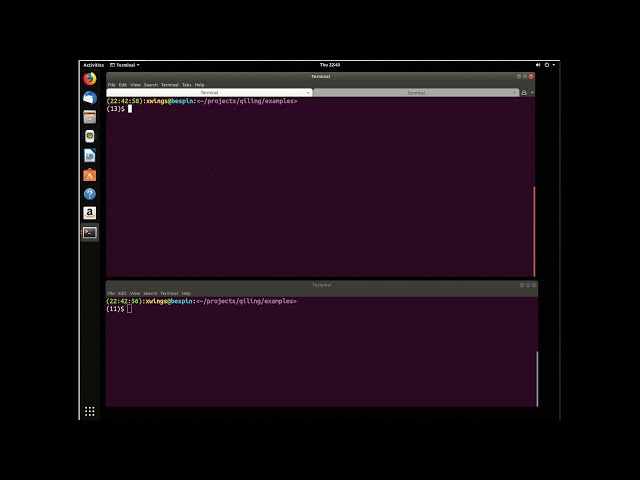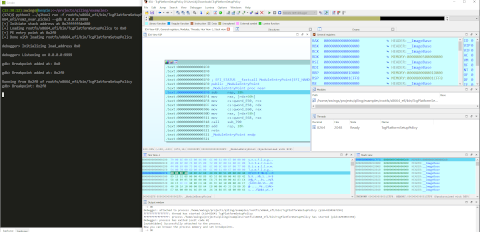Emulating a Windows EXE on a Linux machine.
Using Qiling Framework to emulate a Windows binary on a Linux machine.
Example code
from qiling import *
# sandbox to emulate the EXE
def my_sandbox(path, rootfs):
# setup Qiling engine
ql = Qiling(path, rootfs)
# now emulate the EXE
ql.run()
if __name__ == "__main__":
# execute Windows EXE under our rootfs
my_sandbox(["examples/rootfs/x86_windows/bin/x86_hello.exe"], "examples/rootfs/x86_windows")
Emulating Windows Registry
Emulating Windows registry with Qiling Framework
Example code
import sys
sys.path.append("..")
from qiling import *
from qiling.const import QL_VERBOSE
def my_sandbox(path, rootfs):
ql = Qiling(path, rootfs, verbose=QL_VERBOSE.DEBUG)
ql.run()
if __name__ == "__main__":
my_sandbox(["rootfs/x86_windows/bin/RegDemo.exe"], "rootfs/x86_windows")
Youtube video
Catching Wannacry's killer swtich
This demo executed wannacry.bin (md5 41b5ba4bf74e65845fa8c9861ca34508) and look for the killerswitch url
Example code
import sys
sys.path.append("..")
from qiling import *
from qiling.const import QL_VERBOSE
def stopatkillerswtich(ql):
print("killerswtch found")
ql.emu_stop()
if __name__ == "__main__":
ql = Qiling(["rootfs/x86_windows/bin/wannacry.bin"], "rootfs/x86_windows", verbose=QL_VERBOSE.DEBUG)
ql.hook_address(stopatkillerswtich, 0x40819a)
ql.run()
Youtube video
Dynamically patch a Windows crackme, make it always displays "Congratulation" dialog.
Using Qiling Framework to dynamically patch a Windows Crackme and making it always displays "Congratulation" dialog.
Example code
from qiling import *
def force_call_dialog_func(ql):
# get DialogFunc address
lpDialogFunc = ql.unpack32(ql.mem.read(ql.arch.regs.esp - 0x8, 4))
# setup stack memory for DialogFunc
ql.stack_push(0)
ql.stack_push(1001)
ql.stack_push(273)
ql.stack_push(0)
ql.stack_push(0x0401018)
# force EIP to DialogFunc
ql.arch.regs.eip = lpDialogFunc
def my_sandbox(path, rootfs):
ql = Qiling(path, rootfs)
# NOP out some code
ql.patch(0x004010B5, b'\x90\x90')
ql.patch(0x004010CD, b'\x90\x90')
ql.patch(0x0040110B, b'\x90\x90')
ql.patch(0x00401112, b'\x90\x90')
# hook at an address with a callback
ql.hook_address(force_call_dialog_func, 0x00401016)
ql.run()
if __name__ == "__main__":
my_sandbox(["rootfs/x86_windows/bin/Easy_CrackMe.exe"], "rootfs/x86_windows")
Youtube video
GDBserver with IDAPro
Solving a simple CTF challenge with Qiling Framework and IDAPro
Youtube video
Solving malformed ELF header + Anti-Debug crackme, with Qiling GDBserver + Qiling qltool
Youtube video
Fuzzing with Qiling's AFL extension
Qiling can be used to fuzz binary or firmware with AFL++'s unicorn mode
Note that the demo code may be outdated, more information on fuzzing with Qiling can be found here.
The general steps should be like this:
# Build AFL++'s unicorn mode
git clone https://github.com/AFLplusplus/AFLplusplus.git -b dev
make -C AFLplusplus
cd AFLplusplus/unicorn_mode ; ./build_unicorn_support.sh
# Fuzz simple x86_64 binary
AFL_AUTORESUME=1 AFL_PATH="$(realpath ./AFLplusplus)" PATH="$AFL_PATH:$PATH" afl-fuzz -i afl_inputs -o afl_outputs -U -- python3 ./fuzz_x8664_linux.py @@
Example code
# No more need for importing unicornafl, try afl.ql_afl_fuzz instead!
import os
import sys
from typing import Optional
sys.path.append("../../..")
from qiling import Qiling
from qiling.const import QL_VERBOSE
from qiling.extensions import pipe
from qiling.extensions import afl
def main(input_file: str):
ql = Qiling(["./x8664_fuzz"], "../../rootfs/x8664_linux",
verbose=QL_VERBOSE.OFF, # keep qiling logging off
console=False) # thwart program output
# redirect stdin to our mock to feed it with incoming fuzzed keystrokes
ql.os.stdin = pipe.SimpleInStream(sys.stdin.fileno())
def place_input_callback(ql: Qiling, input: bytes, persistent_round: int) -> Optional[bool]:
"""Feed generated stimuli to the fuzzed target.
This method is called with every fuzzing iteration.
"""
# feed fuzzed input to our mock stdin
ql.os.stdin.write(input)
# signal afl to proceed with this input
return True
def start_afl(ql: Qiling):
"""Have Unicorn fork and start instrumentation.
"""
afl.ql_afl_fuzz(ql, input_file=input_file, place_input_callback=place_input_callback, exits=[ql.os.exit_point])
# get image base address
ba = ql.loader.images[0].base
# make the process crash whenever __stack_chk_fail@plt is about to be called.
# this way afl will count stack protection violations as crashes
ql.hook_address(callback=lambda x: os.abort(), address=ba + 0x1225)
# set afl instrumentation [re]starting point. we set it to 'main'
ql.hook_address(callback=start_afl, address=ba + 0x122c)
# okay, ready to roll
ql.run()
if __name__ == "__main__":
if len(sys.argv) == 1:
raise ValueError("No input file provided.")
main(sys.argv[1])
Screenshot
Emulating Netgear R6220
Almost a complete emulation of Netgear R6220, a 32bit MIPS based router runs on a x86 64bit Ubuntu.
Example code
import sys
sys.path.append("..")
from qiling import *
from qiling.os.posix import syscall
from qiling.const import QL_VERBOSE
def my_syscall_write(ql, write_fd, write_buf, write_count, *rest):
if write_fd == 2 and ql.os.file_des[2].__class__.__name__ == 'ql_pipe':
ql.os.definesyscall_return(-1)
else:
syscall.ql_syscall_write(ql, write_fd, write_buf, write_count, *rest)
def my_netgear(path, rootfs):
ql = Qiling(
path,
rootfs,
verbose = QL_VERBOSE.DEBUG,
profile = "netgear_6220.ql"
)
ql.root = False
ql.bindtolocalhost = True
ql.multithread = False
ql.add_fs_mapper('/proc', '/proc')
ql.os.set_syscall(4004, my_syscall_write)
ql.run()
if __name__ == "__main__":
my_netgear(["rootfs/netgear_r6220/bin/mini_httpd",
"-d","/www",
"-r","NETGEAR R6220",
"-c","**.cgi",
"-t","300"],
"rootfs/netgear_r6220")
Youtube video
Emulating ARM router firmware on Ubuntu X64 machine
Qiling Framework hot-patches and emulates ARM router's httpd on a X86_64Bit Ubuntu
Example code
import os, socket, sys, threading
sys.path.append("..")
from qiling import *
from qiling.const import QL_VERBOSE
def patcher(ql):
br0_addr = ql.mem.search("br0".encode() + b'\x00')
for addr in br0_addr:
ql.mem.write(addr, b'lo\x00')
def nvram_listener():
server_address = 'rootfs/var/cfm_socket'
data = ""
try:
os.unlink(server_address)
except OSError:
if os.path.exists(server_address):
raise
# Create UDS socket
sock = socket.socket(socket.AF_UNIX,socket.SOCK_STREAM)
sock.bind(server_address)
sock.listen(1)
while True:
connection, client_address = sock.accept()
try:
while True:
data += str(connection.recv(1024))
if "lan.webiplansslen" in data:
connection.send('192.168.170.169'.encode())
elif "wan_ifname" in data:
connection.send('eth0'.encode())
elif "wan_ifnames" in data:
connection.send('eth0'.encode())
elif "wan0_ifname" in data:
connection.send('eth0'.encode())
elif "wan0_ifnames" in data:
connection.send('eth0'.encode())
elif "sys.workmode" in data:
connection.send('bridge'.encode())
elif "wan1.ip" in data:
connection.send('1.1.1.1'.encode())
else:
break
data = ""
finally:
connection.close()
def my_sandbox(path, rootfs):
ql = Qiling(path, rootfs, verbose=QL_VERBOSE.DEBUG)
ql.add_fs_mapper("/dev/urandom","/dev/urandom")
ql.hook_address(patcher ,ql.loader.elf_entry)
ql.run()
if __name__ == "__main__":
nvram_listener_therad = threading.Thread(target=nvram_listener, daemon=True)
nvram_listener_therad.start()
my_sandbox(["rootfs/bin/httpd"], "rootfs")
Youtube video
Emulating UEFI
Qiling Framework emulates UEFI
import sys
import pickle
sys.path.append("..")
from qiling import *
from qiling.os.uefi.const import *
def force_notify_RegisterProtocolNotify(ql, address, params):
event_id = params['Event']
if event_id in ql.loader.events:
ql.loader.events[event_id]['Guid'] = params["Protocol"]
# let's force notify
event = ql.loader.events[event_id]
event["Set"] = True
ql.loader.notify_list.append((event_id, event['NotifyFunction'], event['NotifyContext']))
######
return EFI_SUCCESS
return EFI_INVALID_PARAMETER
if __name__ == "__main__":
with open("rootfs/x8664_efi/rom2_nvar.pickel", 'rb') as f:
env = pickle.load(f)
ql = Qiling(["rootfs/x8664_efi/bin/TcgPlatformSetupPolicy"], "rootfs/x8664_efi", env=env)
ql.os.set_api("hook_RegisterProtocolNotify", force_notify_RegisterProtocolNotify)
ql.run()
Screenshot








